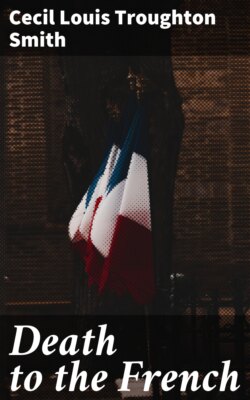Читать книгу Death to the French - Cecil Louis Troughton Smith - Страница 3
На сайте Литреса книга снята с продажи.
CHAPTER 1
ОглавлениеTable of Contents
Half a dozen horsemen were picking their way up a breakneck path. The leader of them was most conspicuous by the excellence of his mount, for his saddle fittings were severely plain and he wore a plain blue cape and coat and an unglazed cocked hat in sharp contrast with the scarlet coats and plumes of several of his followers. But when he pulled up at the brow of the hill and peered keenly forward across the tangled countryside some hint might be gained of the qualities which constituted him the leader. He had an air of authority and of composed self-reliance, and his blue eyes swept across the valley in a glance which noted its features instantly. The big, arrogant nose told the reason why the men in the ranks called him ‘Conky’ and ‘The long-nosed beggar that beat the French’, just as the hauteur of his expression explained why his subordinates alluded to him half ruefully, half deferentially, as ‘The Peer’.
Drawn up below him was a column of scarlet-coated infantry, standing at ease; right ahead keen sight could discern little clusters and groups of men in green, mere dots on the landscape, sheltering behind trees and in dips in the ground. An occasional puff of smoke told that beyond the skirmishing line was the enemy. Lieutenant-General Lord Wellington hitched his sabretache on to his saddlebow, opened a notebook on it, and scribbled a few words on one of its pages, which he tore out. A scarlet-coated dragoon officer walked up his horse alongside as he did so, and took the folded sheet.
‘For General Craufurd,’ was all that was said to him.
The dragoon mechanically repeated ‘For General Craufurd’ and set his horse at the steep slope before them.
‘Time for Craufurd to get back, Murray,’ said Wellington. ‘Now I want to see the columns across the river.’
He wheeled his horse and set spurs to him, and next moment they were clattering down the stony path again, sparks flying and accoutrements clashing as the rest of the staff tried to maintain the breakneck speed and headlong carelessness of danger which characterized the movements across country of the Commander-in-Chief. The dragoon officer would have a busy time trying to find his way back to his post of duty after delivering the order which sets this tale in motion.
A bugle was sounding out to the left.
‘Fire and retire,’ said a lieutenant to himself, listening to the high long-drawn notes. ‘And not too soon, either. Where’s that picket?’
He strode away along the top of the little hill to look for it, with his crooked sword trailing at his side. To the conservative military eye his uniform was a ludicrous mixture. It was dark green instead of the scarlet which had won honour for itself on fifty battlefields; the black braid on it, the busby, the pelisse hung across the shoulders, all indicated, absurdly in an infantryman, an aping of Hussar equipment accentuated by the crooked sword. Yet it was only natural, because the Ninety-Fifth Foot were supposed to inherit some of the traditions set up by the Hussars when they were the most irregular of irregular horse. On the other hand the colour of the tunic, and the bugle horn badge, were no legacy from the Hussars—they recalled to the memory the fact that the first rifle regiments employed by the British Government had been recruited from the huntsmen of German princelings. Nevertheless no one now dreamed of sneering at this fantastic attire; the Ninety-Fifth Foot—the Rifle Brigade—had in the short ten years of its existence won itself a reputation worthy of the envy of any older unit.
‘Fire and retire,’ repeated the lieutenant to himself, as the bugle called again more insistently. There was a scattering rifle fire out to the left now, to endorse the urgency of the call. The dozen riflemen standing awaiting the lieutenant’s decision on the top of the hill showed no signs of agitation. They knew their officer and trusted him, despite the fact that he was not yet nineteen years old. They had twice followed him across Spain, to Corunna and Talavera—to say nothing of the dreary marches of Walcheren—and they knew they could rely on him. The lieutenant shaded his eyes with his hand, but as he did so there was a clatter of equipment down in the valley and the missing picket came running up the hill.
‘You’re late, sergeant,’ snapped the lieutenant.
‘Yessir. We was nearly cut off and had to get round them,’ explained the sergeant, and then, apologetically, ‘Dodd’s missing, sir.’
‘Dodd’s missing?’
‘Yessir. I sent him forward and—’
‘Do you know what happened to him?’
‘No, sir. Didn’t hear any shots fired out his way.’
The bugle rang out again amid a spatter of musketry.
‘We can’t wait for him,’ said the lieutenant, with a decision acquired in a hundred rearguard actions. ‘Sorry for him, but I expect he’ll find his way back to us. Fall in, there. Left in file. Quick march.’
And the half company moved off, their rifles at the trail. The Ninety-Fifth were part of Craufurd’s famous Light Division, whose boast was that they were always first into action and last out. Now they were covering the last stages of Wellington’s retreat to the lines of Torres Vedras—the retreat during which they captured more prisoners than they left behind. But to-day they would have to report at least one ‘missing’—Rifleman Matthew Dodd, cut off from his unit by the fortune of war.
